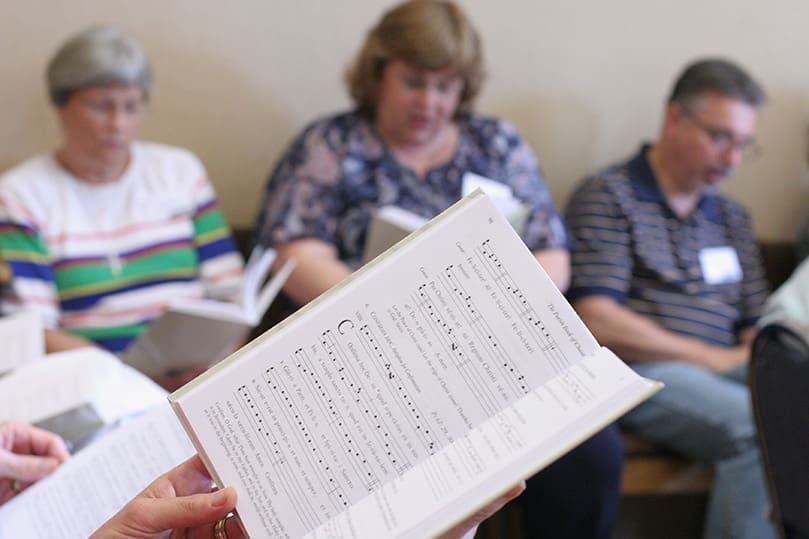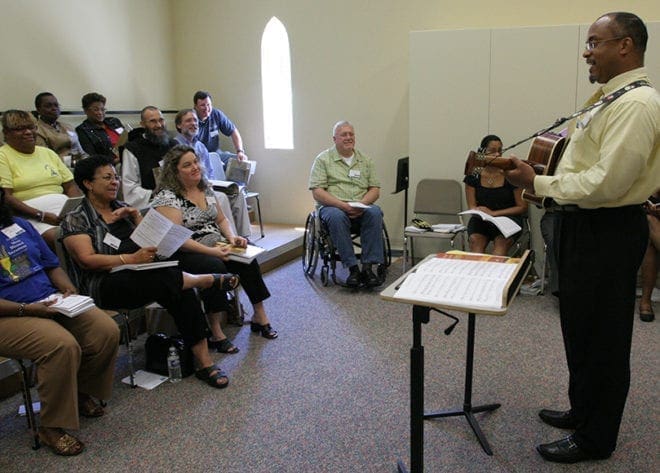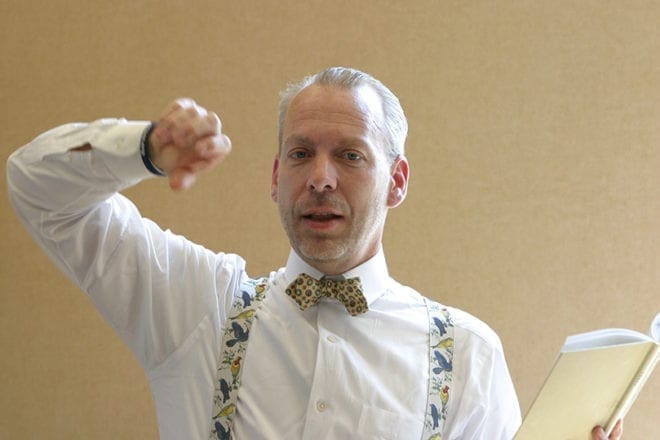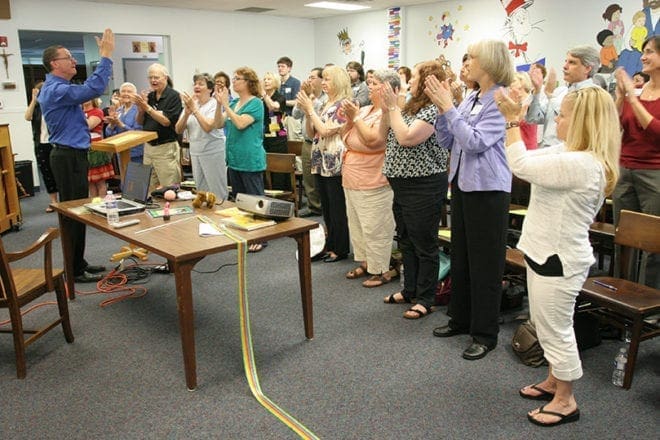 Photo By Michael Alexander
Photo By Michael Alexander
Atlanta
Music Symposium Gives Tools To Ministers
By STEPHEN O'KANE, Staff Writer | Published September 17, 2009
Music ministers know just how difficult it is to get everyone to sing in church on Sunday mornings. That’s why it came as a surprise to a few of them when the opening Mass for the second annual Southeastern Liturgical Music Symposium was alive with powerful, booming voices.
The focus of the symposium this year, which was held on Saturday, Aug. 22, at Our Lady of the Assumption Church, was to give as many useful tools to music ministers as possible.
With qualified speakers, popular vendors and prayer time, attendees were given plenty of resources from which to learn.
The lineup included Rory Cooney, a composer and director of liturgy and music at St. Anne Church, Barrington, Ill.; Dr. Kevin Johnson, chairman of the music department at Spelman College, Atlanta; Lee Gwozdz, director of music for Corpus Christi Cathedral, Corpus Christi, Texas; Jeffrey Tucker, managing editor of Sacred Music; and keynote speaker Archbishop Wilton D. Gregory.
Four workshops were presented to more than 200 participants during breakout sessions, each led by a different speaker.
“The focus of the symposium was on the needs of the liturgical music community in the archdiocese,” wrote Father Theodore Book, director of the archdiocesan Office of Divine Worship, the symposium sponsor.
“We strove to find speakers and prepare an event that would be useful and exciting for musicians from a wide variety of cultural backgrounds with different musical styles and levels of expertise,” he continued. “The diversity among the presenters made sure that there was something for everyone and that a real dialogue could take place among different musical styles and traditions.”

Attendees look on as Dr. Kevin Johnson, right, of Our Lady of Lourdes Church, Atlanta, plays a few chords to a responsorial psalm during a workshop entitled African American Sacred Music in Catholic Worship. Photo By Michael Alexander
After a morning Mass with celebrant Father Charles Byrd, pastor of Our Lady of the Mountains Church, Jasper, and homilist Father Ricardo Bailey, chaplain at Blessed Trinity High School, Roswell, the attendees split for the first session.
Cooney’s presentation, “Music Ministry and the Liturgical Year,” placed music ministers in small groups to work on selecting music to support a Gospel passage.
Each group was asked to read, discuss and choose words or themes that stand out. The exercise was meant to help the musicians choose suitable music for the current liturgical year.
“Don’t judge by what your choir sings well,” he said, encouraging the ministers to really seek out music that expands on the message of the Gospel.
The remainder of the workshop focused on singing music, which the participants visibly enjoyed. Cooney, whose music has been published by Oregon Catholic Press, World Library Publications and GIA Publications, played some of his own works in addition to other popular composers for a unique blend of liturgical music.
Following the first session, the groups gathered for lunch in Moylan Hall. Here they ate, visited with friends from other parishes and had the opportunity to purchase music books and other related swag from vendors.
Michelle Biroschak and Lucille Szedon of St. Thomas Aquinas Church, Alpharetta, enjoyed the event and discussed what they had heard at Gwozdz’s presentation that morning.

Jeffrey Tucker of St Michael the Archangel Church, Auburn, Ala., conducts a workshop called “Sing Like A Catholic.” Photo By Michael Alexander
“It was fabulous, very creative,” said Biroshcak.
“He was showing everybody that they could sing,” added Szedon.
Both told of the discussion the group had about how many people are encouraged not to sing during liturgical celebrations, whether it is because of technical ability or age or any number of reasons.
The pair of choir members felt encouraged after leaving the workshop and were excited to share what they learned.
When the music ministers finished up lunch they split again to hear another workshop. In addition to Gwozdz’s presentation, “Sing! From Child to Adult,” attendees could participate in Tucker’s “Sing Like a Catholic,” which focused on music intrinsic to the Roman Rite, or Johnson’s “African-American Sacred Music in Catholic Worship,” which opened a conversation about techniques and approaches to using African-American music for all cultural backgrounds.
The day ended in much the same way it began, with song and prayer at vespers.
Archbishop Gregory also gave his address in which he emphasized the importance of music in the liturgy. Fifty years after the Second Vatican Council, the Catholic Church strives to achieve the right balance among the treasures of the church’s musical heritage, encouraging new musical compositions “that reflect the genius of our own age,” and drawing wisely “from the multicultural heritages of the many people of the Church,” he said.
“In other words, we still struggle to keep what is ancient, promote what is new, and prudently welcome some of the musical treasures of the many people who comprise our parish communities—all of these gifts must be used in conformity with the liturgical life of the Church today,” he said.

Lee Gwozdz, left, the director of music at the Corpus Christi Texas Cathedral ends his workshop session with a vocal/choral exercise that brought the room to its feet. Photo By Michael Alexander
“It is unacceptable to choose to do only one of these functions in isolation—even when you may have a personal preference for one over the other two,” he told the music ministers.
He also spoke about the quality of music that must be chosen to intensify “the spiritual reception of the Mystery that we proclaim.”
There is a tension in the relationship between God and his people, he said, a tension between the transcendent God who is completely beyond the human realm and the imminent presence of God who chose to become human and to make himself present in ordinary elements like bread and wine.
Some musicians believe one form of music is the best, but both the transcendent and the more familiar express creative aspects of this tension, the archbishop said.
Archbishop Gregory also said he was very appreciative of the work that the music ministers continue to do and that he believed the investment in great music in a parish, accompanied by excellent preaching and a spirit of hospitality, beauty and decorum, was essential to a vital parish.
“I thank all of you for your devotion to the Church’s worship and for placing your own talents at the service of the people of God,” he said. “We have made significant progress in developing music of our own time, combined with the rich legacy of music from the Church’s past so that today’s songs of praise are reflective of who we are and how we are related to those who have gone before us and share the same love of God who is Father, Son and Holy Spirit ever worthy of our praise and thanksgiving.”
“This year’s symposium was a great success,” said Father Book, who has received many positive comments about the event. “The experience from last year’s symposium helped us to make this year’s even smoother than the year before. As we finished this year’s event, many of the participants told us to expect them back next year.”